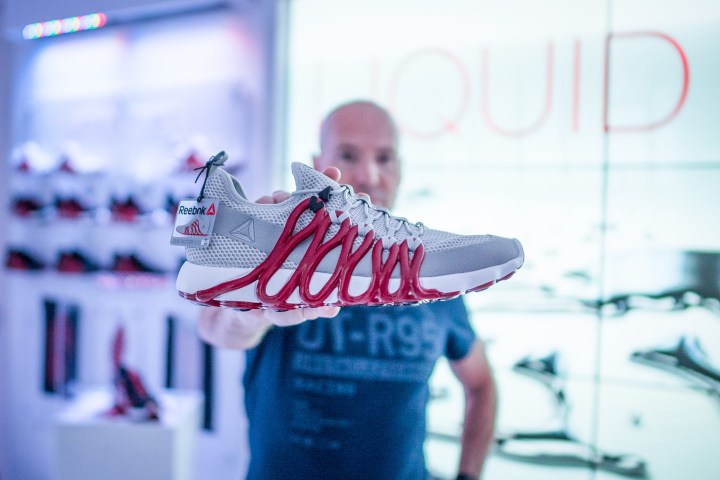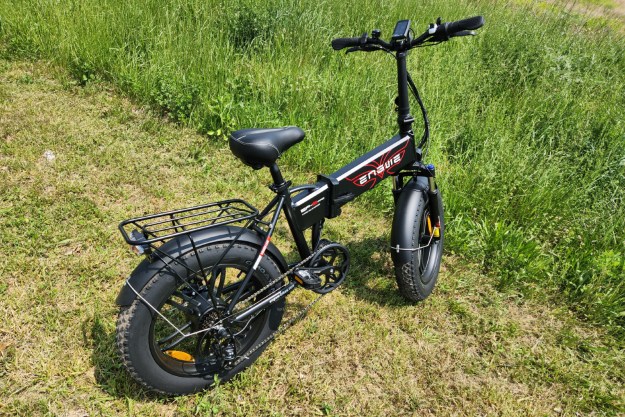
The Reebok team dedicated to keeping the innovations coming, Reebok Future, recently announced it was making footwear out of organic materials. Its Cotton + Corn initiative uses corn products to make shoe soles instead of petroleum, and is designed off of the Reebok Classic model.
Indeed, Reebok has been catching eyes as of late — not with sales, but with tech. Last year, Reebok Future unveiled a new way of manufacturing shoes with its “Liquid Factory.” In the factory, robots made the entire outsole of the Liquid Speed shoe using an advanced 3D-drawing technique that wove liquid material in a pre-programmed pattern, without a traditional mold.
Digital Trends spoke with Bill McInnis, head of Reebok Future, to get a peek inside the mad lab and find out how Reebok is attempting to keep an innovative edge in the footwear industry during a time of self-lacing shoes.
Digital Trends: How long has Cotton + Corn been in the works?
Bill McInnis: We’ve been working on the concept for about five years, and it’s been a series of stops and starts and a lot of research into finding the right material. Part of the problem is you need to make a product where nobody has to compromise how the shoe looks or how the shoe feels. So we had some earlier materials where it kind of looked like a shoe, but it didn’t feel right. It didn’t hold up how we needed it to hold up. We now think we’ve cracked the code in terms of using the right corn and cotton material and building the right products out of that with the right look and the right feel.
What were some materials Reebok Future tried to use that didn’t end up working?
Some of them are branded so we don’t want to get into that. As far as natural materials, things like cork and other natural materials were good, but not good enough to meet the needs of what our consumers expected.
Sneakers made out of cork? That would be pretty intriguing as a shoe. What other organic materials are you testing for use later on?
Well, we can’t get into what we’re adding to it, but we are adding new materials to the menu. The idea is these first Cotton + Corn shoes will be lifestyle based, so they’ll be designed off our Reebok Classic platform. Then we’re going to continue to add materials to the menu so we can do performance products as well.
How do organic materials like this affect pricing?
It’s going to add a little cost basically on the raw material side. Our goal is to get them close to comparable to what it costs us to make shoes now. With any new material, there’s always a little bit of a premium at the beginning.
All the major footwear brands are looking to technology for an advantage. Just look at innovations like Nike’s Hyperadapt 1.0 power-lacing sneakers. Is Reebok Future looking to make sneakers like that, or are you planning some other revolutionary release?
We’re going to win by doing revolutionary products as opposed to evolutionary.
We’re certainly not the biggest shoe brand out there. So, when we do something it has to be very, very different to make a dent in the universe and make people pay attention. Something like Liquid Factory is unique to us versus everybody else in the industry. Something like Cotton + Corn is 100 percent unique to us from everybody else in the industry. So we’re not going to win by doing our version of what somebody else is doing. We’re going to win by doing revolutionary products as opposed to evolutionary.
How long has Reebok Future been around?
We’ve been around under different names for about 25 years now. Early on it was called Reebok Advanced Concept, and it’s been called The Innovation Team. It goes all the way back to the days of the [Reebok Pump].
So, Reebok has always had a big interest in using advancements in technology to push footwear?
Absolutely. I would say, in our current setup, the point of distinction between what we’ve done in the past is we’re much more process focused. If you change how you make something, where you make something, and who you make it with, you should fundamentally end up with something different in the back end. A good example is the Liquid Factory release we did late last year.
Trying to reinvent footwear doesn’t sound conducive to a normal, day-to-day job. Other sneaker designers I’ve talked to say a lot of their day is spent brainstorming and thinking outside the box; what’s daily life like at Reebok Future?
It’s interesting for me to come into work every day because we spend most of our time looking outside the athletic footwear industry. So our partner on Cotton + Corn is [bio-product manufacturer] DuPont Tate and Lyle. They create sustainable materials. They’re turning corn into the material we can turn into the bottom of the shoe. That’s someone we never would have talked to for normal shoe manufacturing.
When we did Liquid Factory, we were talking to robotics manufacturers. We were talking to huge industrial dispensing people. We were talking to automotive manufacturers. It really gets you out of your day-to-day of how to make the next great shoe. If you only focus on that, you tend to use the same material and same contacts everybody else in the industry is using. You want to look outside that to other industries to see how they do it — and bring that back to apply it to footwear.
Speaking of Liquid Factory, you used a new process of robots using 3D-drawing to create a shoe’s outsole with liquid instead of a mold. Has Reebok started using that new Liquid Factory process for future shoes?
Yes, we have the Liquid Factory set up in Rhode Island, and we’re working on that right now. The next batch should be later this year.
Have you been working on any product you feel would be as attention-grabbing as self-lacing shoes?
Yeah, you always feel that way. [Laughs] I think we have things in the pipeline that are going to look and feel very different than anything else that you have seen out there so far.


